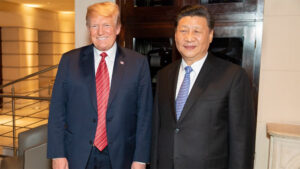Some countries are adapting to Trump and some don’t know the rules of the global system have changed.
The Japanese government leaked a provisional policy document to Reuters late Jan 31 titled “U.S.-Japan Growth and Employment Initiative,” which noodles over how Japan can invest more heavily into the United States in a variety of economic sectors. The policy was supposedly read out loud to Reuters staff, and it is very clearly in the under-development stage with a great many gaps.It is expressly meant to pave the way for Japanese Prime Minister Shinzo Abe’s upcoming summit with Donald Trump on Feb. 10. Among the document’s noodling includes possible investments into various infrastructure projects and the shale sector. The leaker indicated that the investment would be on a scale that could generate “hundreds of thousands” of American jobs.
(Before you discount that “figure” as ludicrous, keep in mind that the Japanese economy has been so moribund for so long thatthe Japanese regularly force the near-entirety of their pension system — with a huge dose of flat-out printed money — to invest in Japanese government debt, an asset with a zero percent return. It is well within the BOJ’s purview to instead purchase foreign assets if that serves Tokyo’s purposes, and to do so in a volume that quite literally reaches the high hundreds of billions of dollars.)
If this feels like a bribe, you’re thinking about things the right way.
The United States is backing away from the world writ large, a development that spells utter disaster for the many countries that designed their economic, political and military systems around the central concept of American engagement. Every bi- and multi-lateral relationship that the Americans have is in the process of being obviated. That includes everything from the UN to the WTO to NATO … to the Japanese alliance.
In Accidental Superpower I noted that in the coming Disorder there would only be a very short list of countries with which the Americans would choose to remain entangled, largely because the Americans perceive unmitigated benefits. If your country isn’t on that list, and you want to retain American engagement, you have to come to Washington and plead your case. And if you come empty handed the answer will almost certainly be “no”.
Abe apparently intends to try and flat out purchase American involvement. A bit crass for my tastes, but that doesn’t mean it won’t work.
The Japanese understand what’s happening. They know full well that their exposure to global energy markets and the fragility of their manufacturing supply chains makes them vulnerable. The Brits get it as well. The Canadians are desperately hoping that they are on the “unmitigated benefits” list (they probably are). The Mexicans are twisting in the wind, unsure if what’s coming out of the White House is rhetoric, policy or a negotiating strategy (it’s probably the latter). The Chinese are having problems coming to grips with just how bad things are about to get for them.
And the mainland Europeans are in flat-out denial.
American security involvement and American trade access are what ended the European civil war of roughly 1800 thru 1945, and generated the past 70 yoears of peace and prosperity. Europe is only able to import raw materials and export finished products because of American global overwatch, to say nothing for Europe’s (in)ability to defend itself (or in general get along with itself). In fact, without swap lines and loans from the Federal Reserve, it isn’t much of a stretch to assert that the Euro would have failed already. Without express U.S. involvement and strategic sponsorship, there is no European Union.
Rather than start tweaking themselves towards a system that might be sustainable without American overwatch and largess, most European politicians right up to the German and French premiers are engaging in a (not entirely) diplomatic back-and-forth with the Trump administration. It isn’t that I’m taking Trump’s side on any particular ethical, legal, constitutional, economic, strategic or practical issue, but instead that continental Europeans are acting as if the old rules still applied.
And unlike a week ago when the issues at stake didn’t hold immediate implications for the EU, now they do.
Apparently I was wrong. National Trade Council chair Peter Navarro is indeed aware of the existence of countries that are not China. Specifically, he knows where Germany is. On the same day the Japanese were testing the waters with their…consulting fee suggestion, Navarro laid into German trade policy. Specifically, he noted that the euro in essence functions as means of depressing the cost of German exports, constituting an unfair trade advantage.
Navarro is both wrong and right. Wrong in that the German intent for the euro isn’t to facilitate exports outside of the eurozone, but instead to induce economic convergence among the eurozone’s members and thus bulwark all of them against international volatility, and strengthen all of them as an internal trade bloc
But that’s not what has happened. The Europeans have proven completely incapable of grinding down financial, fiscal and political barriers within the bloc, so instead of helping everyone converge, the euro has instead established a dependency system in which Germany is the indisputable center of gravity. Since this is done in the context of a currency union, the weaker members have the effect of dragging the currency’s value down. And here’s where Navarro is dead-on correct: the failure of Europe to federalized has devolved the euro into an “implicit deutschemark that is grossly undervalued”. That was never the Germans’ intent, but it is most definitely the outcome — and will remain so until Portugal and Greece look more like the Frankfurt (which isn’t going to happen in our lifetimes).
It is highly unlikely that the Trump administration will be impressed with a “U.S.-Germany Growth and Employment Initiative”, even if Berlin had the political and economic bandwidth to fashion one. The accruing nature of everything threatening Europe is simply so multi-vectored, entrenched and damning that the Continent is now exactly the sort of commitment that the Americans are not interested in.
Yet if anything, that understates the challenge that Europe now faces.
The primary responsibility of the National Trade Council that Navarro leads is to prosecute trade wars. Which means it isn’t just that the European Union cannot exist without express U.S. support, but now also that the United States seems about to actively kick out the Union’s scaffolding.







